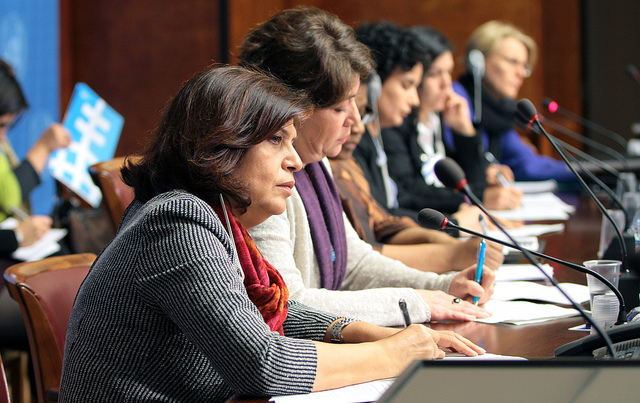Over two weeks, issues affecting gender and sexuality will be discussed by Member States, UN entities and NGOs from all regions of the world. The outcome is the adoption of a document known as ‘Agreed Conclusions’ that stipulates commitments by States on these issues.
ISHR will be advocating for the rights of women human rights defenders (WHRDs), lesbian, bisexual, trans and intersex (LBTI) rights defenders, national human rights institutions, and civil society access and participation.
Challenges faced by WHRDs – why are we fighting for language for their protection?
WHRDs face specific challenges based on who they are and what they do. Gender-based and systematic inequality, violence and discrimination against WHRDs is common, particularly in highly patriarchal societies with strict notions about sexuality, gender roles, and a woman’s place in the community and home. Despite these obstacles, WHRDs continue to fight for the principles of freedom, justice and equality, as well as stronger social protection systems and greater access to public services.
The realities of human rights defenders must be named and seen; in particular, the realities and the work of WHRDs. Their lives must be honored, recognised and supported. We call on States to support language in the Agreed Conclusions acknowledging WHRDs and their work, the risks and challenges that they face, and calling on States to protect WHRDs and their right to perform their work.
Diversity of all people’s experiences – why are we fighting for inclusive language?
International documents should acknowledge the diversity of all people’s experiences. In this regard, we are disappointed to see attempts to limit the inclusiveness and effect of the Agreed Conclusions. The diversity of families should be acknowledged. Further, attempts to limit the use of more inclusive language such as ‘gender’ seek to render invisible the diversity of people’s identities and experiences. In 2019 it is critical that we strive for an inclusive and progressive Agreed Conclusions.
The participation of national human rights institutions at CSW
The unique status of national human rights institutions (NHRIs) and the importance of their contribution has long been acknowledged by the UN. It is now three and a half years since the landmark General Assembly resolution called on UN mechanisms and processes, including CSW, ‘to enhance the participation of NHRIs and to allow for their contribution.’ Since then, CSW has encouraged its own secretariat, UN Women, to continue considering how to enhance participation, but little has changed.
Stronger direction from CSW to the secretariat is needed to make progress regarding participation. States need to request the secretariat to report on what participation could look like for NHRIs and their networks. States should ask UN Women to draw up a road map for establishing participation on par with the Human Rights Council in Geneva. They should also set a timetable for the delivery of the roadmap! How about scheduling discussion (and decision-making) at next years CSW?
Visas denials restricting access to critical discussions – more needs to be done
Human rights defenders are critical to the work of CSW. However, in the past, many have been restricted from participating as a result of being denied US visas to enter the country. Despite the agreement between the U.S and the UN that prohibits the U.S obstructing the entry of NGOs and those invited by the UN, an overwhelming majority of those denied visas last year were poor, unmarried, childless women. These visa denials ultimately silenced the very voices of those that the 62ndsession of the Commission aimed to empower.
ISHR will continue to monitor visa denials reported during this session. It is imperative that CSW take steps to address this issue. The participation of human rights defenders, who are currently systematically silenced, is essential to the advancement of human rights.
Events at CSW
The role of WHRDs in Peace and Security
ISHR will be hosting a side event with Amnesty International, sponsored by the Permanent Missions of Cote d’Ivoire, Norway, Peru, Tunisia and the UK, on Tuesday 12 March entitled ‘Can there be peace and security without women human right defenders?’.
The insights WHRDs provide and their very work promoting peace and security, should be greatly valued by UN Security Council Members. WHRDs’ very experience of being threatened and attacked – which can itself be a sign of impending conflict – should be instructive to the Council and prompt action.
This event aims to boost debate on the connection between peace and security and WHRDs, and increase understanding beyond the Security Council. Civil society speakers will highlight that sustaining peace is not possible without those that defend human rights.
Reality of Saudi Women Activists – Over 300 days in prison. Over 300 days of torture.
ISHR is co-sponsoring a side event on the situation of WHRDs from Saudi Arabia with CIVICUS, The Gulf Center for Human Rights and Women’s March Global. This side event will involve a discussion on the urgent need to promote and protect the rights of WHRDs in Saudi Arabia, and urgently release those WHRDs who have been imprisoned and tortured for conducting their work.
Contact: Eleanor Openshaw : [email protected]
Photo: Flickr_UN Women




